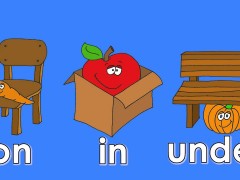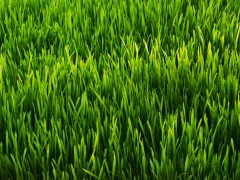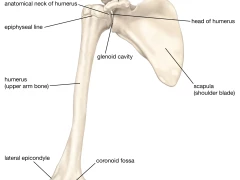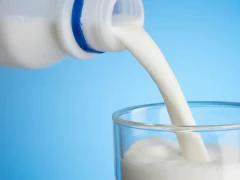garden [ˈɡɑːdn] n. 花园
【扩】gardening 园艺 gardener 园丁
【搭】in the garden 在花园里
* * *
A: Would you like to have a look at my garden?
B: Sure. It's said that you are good at gardening.
A:想参观参观我的花园吗?
B:当然。据说你很擅长园艺。
* * *
under [ˈʌndə] prep. 在……之下
【派】underware 内衣裤
【扩】below 在……之下
【派】under control 在控制范围之内
* * *
A: Try on this coat, please, sir.
B: Oh, it is much too tight under the arms.
A:先生,请穿上这件外套试试看。
B:哦,腋下太紧了。
* * *
tree [triː] n. 树
climb [klaim] v. 爬,攀登
【派】climber 攀登者
【搭】climb up 爬上去
climb over 爬过去
* * *
A: Every foreign visitor to Beijing feels that he or she must climb the Great Wall.
B: Yes, the Great Wall is a man-made wonder.
A:每一位到北京的外国游人都想去爬长城。
B:是的,长城是一个人工奇迹。
* * *
who [huː] pron. 谁
run [rʌn] v. 跑
【派】running 流动的 runny 易流动的 runner 奔跑者
【扩】jog 慢跑
【搭】run out 用完 run away 逃跑 run across 撞见
* * *
A: Are we going to run four laps today?
B: Right. Today we are going to practice running in order to improve your physical fitness.
A:我们今天要跑四圈吗?
B:是的。今天我们要练习长跑以提高你们的身体素质。
* * *
grass [ɡrɑːs] n. 草,草地
after [ˈɑːftə] prep. 在……之后
【派】afterward 后来
【反】before 在……之前
【搭】after school 放学后 after all 毕竟
* * *
A: Will I be sleepy after taking the medicine?
B: No, I don't think so.
A:吃了药以后会不会发困?
B:不,我想不会。
* * *
across [əˈkrɔs] prep. 横过,穿过
cat [kæt] n. 猫
Lesson 32 What's he/she/itdoing? 他/她/它正在做什么?
type [taip] v. 打字
【派】typewriter 打字机
【搭】type up 打完
* * *
A: Did you type this letter?
B: Yes, anything wrong?
A:这封信是你打的吗?
B:是的,有什么问题吗?
* * *
letter [ˈletə] n. 信
【扩】envelope 信封
【搭】write a letter 写信
post a letter 寄信
* * *
A: I want to send a certified airmail letter to China.
B: OK, it comes to two dollars.
A:我想寄一封去中国的航空挂号信。
B:好的,一共2美元。
* * *
basket [ˈbɑːskit] n. 篮子
【派】basketball 篮球
* * *
A: Here's something for you.
B: Oh, it's a lovely basket! I like it very much.
A:这是给你的一点儿小礼物。
B:哦,是个可爱的小篮子。我太喜欢了。
* * *
eat [iːt] v. 吃
【扩】have a meal 吃饭
【搭】eat up 吃光
* * *
A: What would you like to eat tonight?
B: How about fish?
A:你今天晚上想吃点儿什么?
B:吃鱼怎么样?
* * *
bone [bəun] n. 骨
clean [kliːn] v. 清洗
* * *
A: It's your turn to clean the room today.
B: Can you help me to do it this time? I'm under the weather today.
A:今天轮到你打扫屋子了。
B:这次你能帮我打扫吗?我今天不太舒服。
* * *
tooth [tuːθ] n. 牙齿
【派】toothpaste 牙膏 toothbrush 牙刷
【搭】be armed to the teeth 全副武装
* * *
A: I've got a bad tooth. Would you please see if it can be filled?
B: Let me have a check for you first.
A:我有颗牙坏了,你看能不能给补一下?
B:我先帮你检查一下吧。
* * *
cook [kuk] v. 做(饭菜)
【派】cooker 炊具 cooking 烹饪
【扩】chef 厨师
【搭】cook up 编造
cook the book 做假帐
* * *
A: Mary told me that you are good at cooking.
B: Yes, would you like to stay here to have dinner with us tonight?
A:玛丽告诉我说你很擅长烹饪。
B:是的。你今晚要不要留下来和我们一起共进晚餐啊?
* * *
milk [milk] n. 牛奶
* * *
A: Do you want some milk with your coffee?
B: Yes, and add some sugar, too.
A:您的咖啡要加牛奶吗?
B:要,再加一些糖。
* * *
meal [miːl] n. 饭,一顿饭
【派】mealtime 进餐时间
【搭】take a meal 进餐
* * *
A: Does the room rate cover meals?
B: No, I'm afraid you have to pay for your food.
A:房费包括饭费吗?
B:不,恐怕您得为食物付费。
* * *
drink [driŋk] v. 喝
【扩】drunk 酒醉的
【搭】drink water 喝水 drink in 吸收
* * *
A: Do you want to have some beer?
B: No, thanks. I don't drink beer at noon.
A:来点儿啤酒怎么样?
B:不,谢谢,中午我不喝啤酒。
* * *
tap [tæp] n. (水)龙头
noun [具体名词]花园,菜园,果园;庭园;公园;(用于街名)街,广场 - The garden looked uncared for.
verb [vt. 及物动词]做园艺工作,种植花木 - Jim gardened at the homes of friends on weekends.
noun [专属名词]【名】(Garden)(英、意、巴基)加登(人名) - Garden has been digging the garden.
preposition [位置和方向]在(或到、通过)…下面;在…表面下,由…覆盖着;少于,小于,低于;由…控制(或管理、经营); 按照,依据(法律、协议或制度);在…过程中;在…的影响下;用,以(尤指假名);属于,列入,在…项之下;在…情况下,在…条件下 - They found a labyrinth of tunnels under the ground.
adverb [地点副词]在下面;在下面穿过;在水下;少于,小于,较年轻;在昏迷中,陷入昏迷状态 - He took a deep breath before he went under.
adjective [原级]较低的,下面的 - We often slept under the stars.
noun [专属名词]树;木料;树状物 - I planted those apple trees.
verb [vt. 及物动词]vt. 把……赶上树 - Look! It's going up that tree.
verb [vi. 不及物动词]vi. 爬上树;逃上树 - The tree is in bud already.
verb [vt. 及物动词]攀登,攀爬;爬升,升高;上升,升值;提高社会地位,晋升;吃力地爬(移动);(植物)攀缘而上 - Climbing the first hill took half an hour.
noun [抽象名词]攀登,爬升;攀登的地方,攀登物;增值,上升;提高地位,晋升 - ...an hour's leisurely climb through olive groves and vineyards. …
pronoun [人称代词]谁;什么人 - Who is your favourite writer?
verb [vi. 不及物动词]奔跑;跑步;参加(赛跑);举行(比赛);赛(狗、马等);持球跑动进攻;跑垒;迅速做,赶快去;奔忙;做(跑腿差事);(迁移的鱼为产卵而)洄游;管理,经营;(使)运转,(使)运行;开设(服务、课程等);(使)(磁带或录像带)播放,放映 - I excused myself and ran back to the telephone.
noun [具体名词]跑步,赛跑;旅程,航程; 一段(幸运或倒霉的)时光,一系列(成功或失败);连续上演(或放映);尝试,努力;额定产量;抛售(美元、英镑等);争购,抢购 - He was already preparing his run for the presidency.
加上不同的小品词可以表达“追赶,逃跑”等多种含义
- She has run off with all his money. 润了 (带着钱)
- The man ran away with her bag. 拿着包跑
noun [具体名词]草;草地,草坪;<非正式>大麻;<英,非正式> 告密者;草地网球场;牧场;<英,非正式>告密者 - Small things stirred in the grass around the tent.
verb [vt. 及物动词]在…上种草;<英,非正式>(向警方)告发;捕(鱼)并带上河岸;将(某人)撞倒;<美>给(牲畜)喂草 - The grass was dry and patchy.
preposition [位置和方向]在…之后;紧接着;一次接着一次,持续不断地;跟随,在…身后;(按顺序、重要性)在…后面,仅次于;与…对照,对比;鉴于,由于;尽管;寻找,追捕;关于;模仿,依照;以…命名;(表示时间)(…点)过(…分) - After May 19, strikes were occurring on a daily basis.
conjunction [推进连词]在…以后 - After Don told me this, he spoke of his mother.
adverb [时间副词]后来,以后 - Tomorrow. Or the day after.
noun [专属名词]猫,猫科动物 - Cats are lions, tigers, and other wild animals in the same family.
noun [抽象名词]类型,种类;具有某种特征的人,典型;(印刷的)文字,字体;(印刷)铅字,活字;象征;(艺术的)典型,榜样;(宗教学)预兆;(植,动)型,模式标本;(奖章或硬币)图案;(语言学)类型,型 - There are various types of the disease.
verb [vi. 不及物动词](用计算机或打字机)打字;测定…的类型,分型 - I had never really learned to type properly.
noun [可数名词]信,信函;字母;<美>(缝制在运动服上的)校运动队首字母标志;<英,非正式>(代表学位或职位等资格的)首字母缩略词(letters);文学;法律文书,正式文书(letters);字面确切含义;(印刷)一种铅字字体;<古> 学识,渊博的学问 - I had received a letter from a very close friend.
verb [vi. 不及物动词]用字母标注;把字母印刷(或缝制等)于;<美>赢得学校运动队的字母标志 - Burkoth lettered in American football.
noun [专属名词]篮子;一篮的量;(篮球运动的)篮;投篮得分 - There was a complimentary basket of fruit in our room.
noun [专属名词]篮球;篮球运动 - He coaches basketball and soccer.
verb [vt. 及物动词]吃,吃饭;侵蚀,损耗;烦扰(be eating) - If you eat, you have a meal.
noun [抽象名词]少量食物,点心 - Ugh! How can you eat that stuff?
noun [专属名词]骨,骨头;骨质;基本结构,基本(bones) - Many passengers suffered broken bones.
verb [vi. 不及物动词]挑刺,剔骨头;施骨肥于;(与某人)性交;(为应付考试)临时突击 - The bone hasn't knitted together properly.
adverb [程度副词]非常,完全地 - There are not even the bare bones of a garden here – I've got nothing.
adjective [原级]洁净的,干净的;讲卫生的,爱干净的;无污染的 - The subway is efficient and spotlessly clean.
noun [抽象名词]清洁,清扫,打扫 - The windows will have to be given a thorough cleaning.
verb [vt. 及物动词]使)清洁,清理;变干净;做清洁工;干洗;(烹饪前)清除(动物)内脏 - Mary cooked and cleaned for them.
adverb [程度副词]干净地,纯洁地;彻底地,完全地 - It burned clean through the seat of my overalls.
noun [专属名词]牙,齿;(工具边缘、梳子、锯、拉链等的)齿状物,齿;(官方组织、法律等的)威力,效力(teeth);口味,爱好;粗糙面(颜料、胶水能黏附于上) - She had very pretty straight teeth.
verb [vt. 及物动词]给…装齿;啮合 - Add more honey if you have a sweet tooth.
noun [专属名词]厨师,炊事员 - They had a butler, a cook, and a maid.
verb [vt. 及物动词]煮,烧;烹饪,烹调;<非正式>发生,计划中;<美,非正式>干得起劲,干得好;<非正式>篡改,伪造 - Where did you learn to cook?
noun [不可数名词](牛或羊等的)奶;奶汁,母乳;乳液(用于清洁或保护皮肤);(椰子等植物的)白色汁液 - He stepped out to buy a quart of milk.
verb [vt. 及物动词]挤奶;榨取,勒索;充分利用;迎合(观众);(动物,尤指母牛)产奶,出奶;从…抽取液汁(或毒液等) - If someone milks a cow or goat, they get milk from it, using either their hands or a machine.
noun [专属名词]一餐,进餐(时间);一餐所吃的食物;磨成粗粉的东西 - She sat next to him throughout the meal.
verb [vi. 不及物动词]进餐 - The troops are very tired. They haven't had a square meal for four or five days.
verb [vi. 不及物动词]喝,饮;喝酒;饱览,欣赏;<非正式>吸收(水分) - He drank his cup of tea.
noun [具体名词]饮料;一杯,一口,一份(饮料);酒,酒精饮料;酒会,酒宴;<非正式>一片水(the drink) - She had left him because of his drinking.
verb [vi. 不及物动词]轻拍,轻扣,轻敲;敲出节奏,打拍子;凿孔装(龙头或旋塞);旋开(桶等容器)放出液体;在(树)上切口(导出液体);(在电话上)装窃听器,窃听;开发,发掘,利用(资源、形势 - He tapped the table nervously with his fingers.
noun [具体名词]水龙头,阀门,旋塞;轻拍(声),轻敲(声);窃听,窃听器;踢踏舞;(踢踏舞鞋尖或鞋跟上的)金属片;(军营里晚上的)熄灯号,(军队的)葬礼号;<英>(女童子军活动中)篝火晚会上(或集会上)唱的结束曲;<英> 酒吧;螺丝攻;<英>(电) 分接头;轻拍音 - She turned off the tap and dried her hands.





















